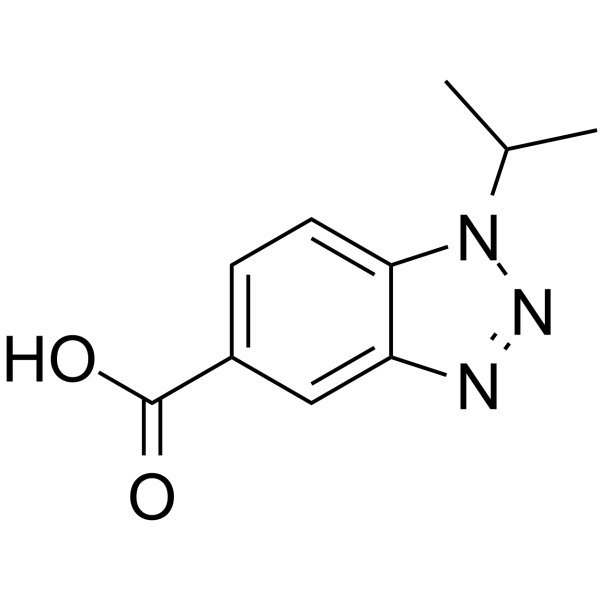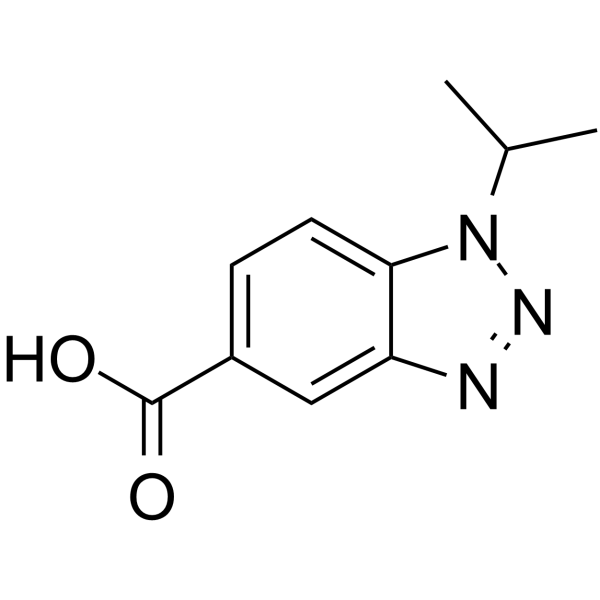1-异丙基1,2,3-苯并三唑-5-羧酸 ,1-Isopropyl-1,2,3-benzotriazole-5-carboxylic acid ,98%
产品编号:Bellancom-B225807| CAS NO:306935-41-1| 分子式:C10H11N3O2| 分子量:205.213
GPR109受体激动剂-1(化合物3a)是人类孤儿G蛋白偶联受体GPR109b的高选择性激动剂,pEC50为6.4。GPR109-受体激动剂-1可用于心脏代谢疾病的研究。
本网站销售的所有产品仅用于工业应用或者科学研究等非医疗目的,不可用于人类或动物的临床诊断或者治疗,非药用,非食用,
| 英文名称 | 1-Isopropyl-1,2,3-benzotriazole-5-carboxylic acid | ||||||||||||||||
|---|---|---|---|---|---|---|---|---|---|---|---|---|---|---|---|---|---|
| CAS编号 | 306935-41-1 | ||||||||||||||||
| 产品描述 | GPR109受体激动剂-1(化合物3a)是人类孤儿G蛋白偶联受体GPR109b的高选择性激动剂,pEC50为6.4。GPR109-受体激动剂-1可用于心脏代谢疾病的研究。 | ||||||||||||||||
| 产品熔点 | 229-230ºC | ||||||||||||||||
| 产品沸点 | 413.9±18.0 °C at 760 mmHg | ||||||||||||||||
| 产品密度 | 1.4±0.1 g/cm3 | ||||||||||||||||
| 产品闪点 | 204.1±21.2 °C | ||||||||||||||||
| 精确质量 | 205.085129 | ||||||||||||||||
| PSA | 68.01000 | ||||||||||||||||
| LogP | 2.05 | ||||||||||||||||
| 蒸气压 | 0.0±1.0 mmHg at 25°C | ||||||||||||||||
| 折射率 | 1.655 | ||||||||||||||||
| 溶解性数据 | In Vitro:
DMSO : 100 mg/mL (487.31 mM; Need ultrasonic) 配制储备液
*
请根据产品在不同溶剂中的溶解度选择合适的溶剂配制储备液;一旦配成溶液,请分装保存,避免反复冻融造成的产品失效。 In Vivo:
请根据您的实验动物和给药方式选择适当的溶解方案。以下溶解方案都请先按照 In Vitro 方式配制澄清的储备液,再依次添加助溶剂:
——为保证实验结果的可靠性,澄清的储备液可以根据储存条件,适当保存;体内实验的工作液,建议您现用现配,当天使用;
以下溶剂前显示的百
| ||||||||||||||||
| 靶点 |
pEC50: 6.40 ± 0.36 (GPR109b) | ||||||||||||||||
| 储存条件 | Store at RT |
相关文档
化学品安全说明书(MSDS)
下载MSDS质检证书(COA)
相关产品
| 风险声明 (欧洲) | 36/37/38 |
|---|---|
| 安全声明 (欧洲) | 26-36/37/39 |
| 海关编码 | 2933990090 |
Synonym: Section 2 - COMPOSITION, INFORMATION ON INGREDIENTS
Risk Phrases: 36/37/38 Section 3 - HAZARDS IDENTIFICATION EMERGENCY OVERVIEW
Irritating to eyes, respiratory system and skin. Potential Health Effects Eye: Causes eye irritation. Skin: Causes skin irritation. May be harmful if absorbed through the skin. Ingestion: May cause irritation of the digestive tract. May be harmful if swallowed. Inhalation: Causes respiratory tract irritation. May be harmful if inhaled. Chronic: Not available. Section 4 - FIRST AID MEASURES Eyes: Flush eyes with plenty of water for at least 15 minutes, occasionally lifting the upper and lower eyelids. Get medical aid. Skin: Get medical aid. Flush skin with plenty of water for at least 15 minutes while removing contaminated clothing and shoes. Ingestion: Get medical aid. Wash mouth out with water. Inhalation: Remove from exposure and move to fresh air immediately. If not breathing, give artificial respiration. If breathing is difficult, give oxygen. Get medical aid. Notes to Physician: Treat symptomatically and supportively. Section 5 - FIRE FIGHTING MEASURES General Information: As in any fire, wear a self-contained breathing apparatus in pressure-demand, MSHA/NIOSH (approved or equivalent), and full protective gear. Extinguishing Media: Use water spray, dry chemical, carbon dioxide, or chemical foam. Section 6 - ACCIDENTAL RELEASE MEASURES General Information: Use proper personal protective equipment as indicated in Section 8. Spills/Leaks: Vacuum or sweep up material and place into a suitable disposal container. Section 7 - HANDLING and STORAGE Handling: Avoid breathing dust, vapor, mist, or gas. Avoid contact with skin and eyes. Storage: Store in a cool, dry place. Store in a tightly closed container. Section 8 - EXPOSURE CONTROLS, PERSONAL PROTECTION Engineering Controls: Facilities storing or utilizing this material should be equipped with an eyewash facility and a safety shower. Use adequate ventilation to keep airborne concentrations low. Exposure Limits CAS# 306935-41-1: Personal Protective Equipment Eyes: Not available. Skin: Wear appropriate protective gloves to prevent skin exposure. Clothing: Wear appropriate protective clothing to prevent skin exposure. Respirators: Follow the OSHA respirator regulations found in 29 CFR 1910.134 or European Standard EN 149. Use a NIOSH/MSHA or European Standard EN 149 approved respirator if exposure limits are exceeded or if irritation or other symptoms are experienced. Section 9 - PHYSICAL AND CHEMICAL PROPERTIES Physical State: Solid Color: off-white Odor: Not available. pH: Not available. Vapor Pressure: Not available. Viscosity: Not available. Boiling Point: Not available. Freezing/Melting Point: 229 - 230 deg C Autoignition Temperature: Not available. Flash Point: Not available. Explosion Limits, lower: Not available. Explosion Limits, upper: Not available. Decomposition Temperature: Solubility in water: Specific Gravity/Density: Molecular Formula: C10H11N3O2 Molecular Weight: 205 Section 10 - STABILITY AND REACTIVITY Chemical Stability: Not available. Conditions to Avoid: Incompatible materials. Incompatibilities with Other Materials: Strong oxidizing agents. Hazardous Decomposition Products: Carbon monoxide, oxides of nitrogen, carbon dioxide. Hazardous Polymerization: Has not been reported Section 11 - TOXICOLOGICAL INFORMATION RTECS#: CAS# 306935-41-1 unlisted. LD50/LC50: Not available. Carcinogenicity: 1-Isopropyl-1H-1,2,3-benzotriazole-5-carboxylic acid - Not listed by ACGIH, IARC, or NTP. Section 12 - ECOLOGICAL INFORMATION Section 13 - DISPOSAL CONSIDERATIONS Dispose of in a manner consistent with federal, state, and local regulations. Section 14 - TRANSPORT INFORMATION IATA No information available. IMO No information available. RID/ADR No information available. Section 15 - REGULATORY INFORMATION European/International Regulations European Labeling in Accordance with EC Directives Hazard Symbols: XI Risk Phrases: R 36/37/38 Irritating to eyes, respiratory system and skin. Safety Phrases: S 26 In case of contact with eyes, rinse immediately with plenty of water and seek medical advice. S 37/39 Wear suitable gloves and eye/face protection. WGK (Water Danger/Protection) CAS# 306935-41-1: No information available. Canada None of the chemicals in this product are listed on the DSL/NDSL list. CAS# 306935-41-1 is not listed on Canada's Ingredient Disclosure List. US FEDERAL TSCA CAS# 306935-41-1 is not listed on the TSCA inventory. It is for research and development use only. SECTION 16 - ADDITIONAL INFORMATION N/A |









 浙公网安备 33010802013016号
浙公网安备 33010802013016号